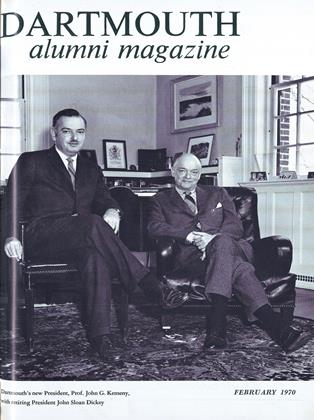Walter W. Arndt, professor of Russian Language and Literature at Dartmouth, is the author along with Lewis Levine of "Grundzuege moderner Sprachbeschreibung," which translates into "Outline of Modern Linguistic Analysis." It is a small, handy guide designed to acquaint the German-learned public with the latest in English language usage. Max Niemeyer Verlag, Tuebingen, West Germany, 1969. 93 pp. Approximately $1.25.
Although most Japanese studying English in school over long periods can read and write it, they cannot understand it when spoken. They remain incapable until they say a word or phrase over and over again or, preferably, write it physically on the palms of their hands or trace it out with a finger on a table. They have learned by eye and not by ear. Paradoxically, bar girls who learn by ear and can neither read nor write, speak better English than young men who have spent eleven years studying under Japanese teachers. In business in the Far East for many years, especially Japan, Robert F. Wilson '21, now with Mobil Oil, has done something about this lack of oral communication. He is co-author of a 312-page working textbook called American-English Conversation Related to Business and Industry. The technique of almost endless repetition is so deadly dull that it would drive an American to saki. This is a cat, this is a cat, this is a cat ... until one is Pavloved into knowing the words and sounds. Mr. Wilson is interested in informal language, the give-and-take of business intercourse, American oriented, without emphasis on purity of diction or refinement. So he stresses the colloquial: Man n woman. Bread n butter. J'eat? [i. e. did you eat?] No, Jew. [i. e. Did you?] Japanese who are nothing if not assiduous will master the book and become capable of going into an office, asking the right questions about duties, commenting on production and distribution, and engaging in the jargon about buying and selling. In oiling the hinges of their tongue, Mr. Wilson has made Japanese more orally mobil and American.
 View Full Issue
View Full Issue
More From This Issue
-
 Feature
FeatureFrom the Primate Patrimony To the Fellowship of Flowers
February 1970 By JAMES W. FERNANDEZ, -
 Feature
FeatureThe Pros and Cons of Coeducation
February 1970 -
 Feature
FeatureSpeaking of Books
February 1970 By FRANCIS BROWN '25, -
 Feature
FeaturePROF. JOHN G. KEMENY CHOSEN AS DARTMOUTH'S 13TH PRESIDENT
February 1970 -
 Article
ArticleThe Undergraduate Chair
February 1970 By WINTHROP A. ROCKWELL '70 -
 Class Notes
Class Notes1918
February 1970 By EDMUND H. BOOTH, DONALD L. BARR
Books
-
 Books
BooksPrinciples of Preaching
November, 1924 -
 Books
BooksEDMUND NILES HUYCK
January 1936 By A. Howard Meneely -
 Books
BooksPROBLEMS IN INCOME TAX FUNDAMENTALS.
October 1937 By C. W. Sargent '15 -
 Books
BooksPOEMS OF DOUBT AND BELIEF.
JANUARY 1965 By DAVID H. KELSEY -
 Books
BooksJUSTICE IN RUSSIA
December 1950 By DIMITRI VON MOHRENSCHILDT -
 Books
BooksYACHTING IN NORTH AMERICA.
March 1949 By Herbert F. West '22.

